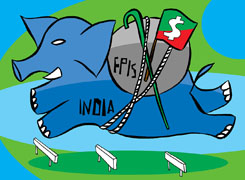Should I invest in Ujjivan Small Finance, Tata Power, and PFC for the long term?
Samraat Jadhav |2507 Answers |Ask -Follow
Stock Market Expert - Answered on Aug 28, 2024
He is a SEBI-registered investment and research analyst and has over 18 years of experience in managing high-end portfolios.
A management graduate from XLRI-Jamshedpur, Jadhav specialises in portfolio management, investment banking, financial planning, derivatives, equities and capital markets.... more

Dear Sir Is ujjivan Small finance and Tata power and PFC is good for long term ?
You may like to see similar questions and answers below
Jigar Patel | Answer |Ask -Follow
Stock Market Expert - Answered on Apr 10, 2023
Samraat Jadhav |2507 Answers |Ask -Follow
Stock Market Expert - Answered on Nov 07, 2023
Ramalingam Kalirajan |10881 Answers |Ask -Follow
Mutual Funds, Financial Planning Expert - Answered on Apr 05, 2024
Dr Dipankar Dutta |1841 Answers |Ask -Follow
Tech Careers and Skill Development Expert - Answered on Dec 14, 2025
Nayagam P P |10854 Answers |Ask -Follow
Career Counsellor - Answered on Dec 14, 2025
Radheshyam Zanwar |6744 Answers |Ask -Follow
MHT-CET, IIT-JEE, NEET-UG Expert - Answered on Dec 14, 2025
Radheshyam Zanwar |6744 Answers |Ask -Follow
MHT-CET, IIT-JEE, NEET-UG Expert - Answered on Dec 14, 2025
Dr Dipankar Dutta |1841 Answers |Ask -Follow
Tech Careers and Skill Development Expert - Answered on Dec 14, 2025
Dr Dipankar Dutta |1841 Answers |Ask -Follow
Tech Careers and Skill Development Expert - Answered on Dec 13, 2025
Dr Dipankar Dutta |1841 Answers |Ask -Follow
Tech Careers and Skill Development Expert - Answered on Dec 13, 2025
Mayank Chandel |2575 Answers |Ask -Follow
IIT-JEE, NEET-UG, SAT, CLAT, CA, CS Exam Expert - Answered on Dec 13, 2025
Radheshyam Zanwar |6744 Answers |Ask -Follow
MHT-CET, IIT-JEE, NEET-UG Expert - Answered on Dec 13, 2025
Mayank Chandel |2575 Answers |Ask -Follow
IIT-JEE, NEET-UG, SAT, CLAT, CA, CS Exam Expert - Answered on Dec 13, 2025
























